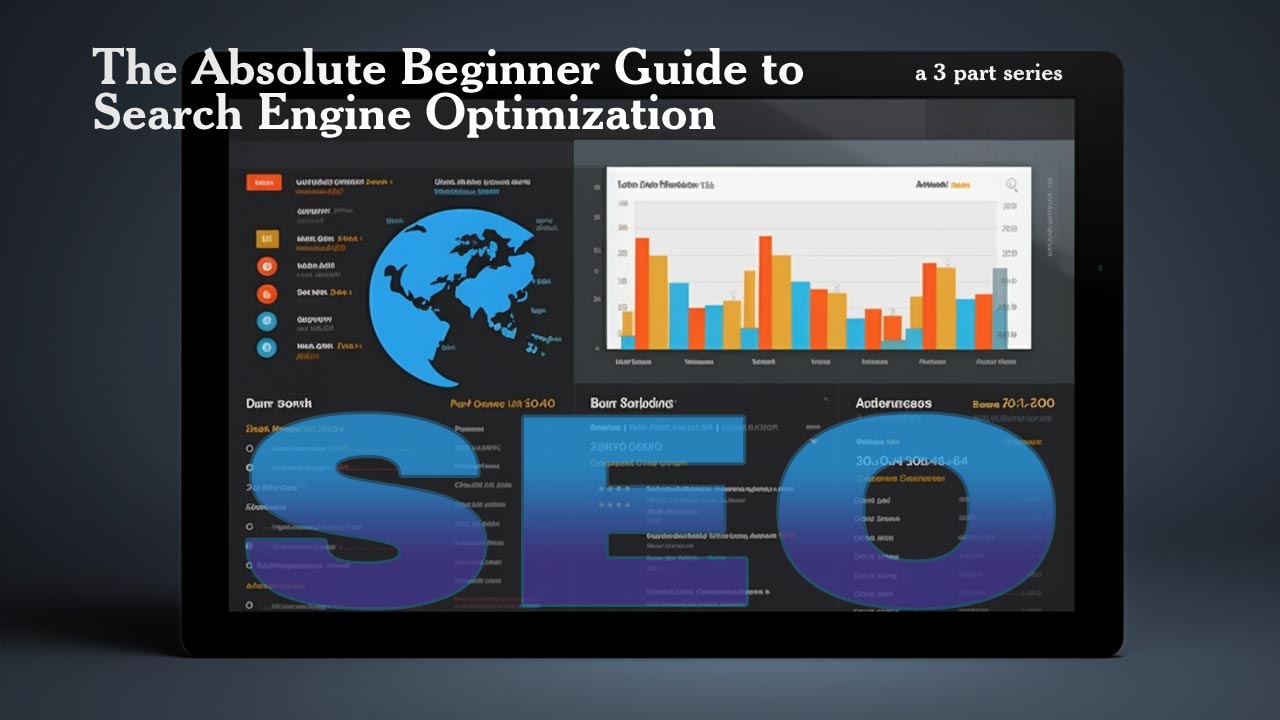This is Part 1 of a 3 Part Series.
Table Of Contents
Continue to Part 2 of this Series
Introduction
In this comprehensive guide, we’ll navigate the complex world of search engine optimization (SEO) by providing you with a thorough understanding of its core concepts, techniques, and best practices. As an absolute beginner, you might feel overwhelmed with the vast amount of information available, but fear not! This guide is designed to be your trusted companion as you embark on your journey to mastering SEO.
The article is structured into several distinct sections, each addressing a particular aspect of SEO. By the end of this guide, you will have a solid foundation to build upon, enabling you to optimize your website effectively for search engines, drive more organic traffic, and ultimately, boost your online presence.
In this introductory section we’ll provide a glimpse into the fascinating world of SEO. We’ll discuss its importance in today’s digital landscape, the core principles you’ll need to grasp, and the various strategies you can employ to achieve your desired results. Furthermore, we’ll explore the ever-evolving nature of SEO and how to stay ahead of the curve.
With the introduction out of the way, let’s dive into SEO:
What is SEO and Why Does It Matter?
In a world where the internet is an integral part of our lives, standing out in the vast ocean of websites can be a daunting task. This is where Search Engine Optimization, or SEO, comes into play.
Understanding SEO
SEO is the process of optimizing a website in order to increase its visibility for relevant searches. The better visibility your pages have in search results, the more likely you are to garner attention and attract prospective and existing customers to your business.
In more technical terms, SEO involves making certain changes to your website design and content that make your site more attractive to a search engine. SEO is the method that organizations use to ensure that their site ranks high in the search engines for relevant keywords and phrases.
Understanding Search Engines and How They Work
The heart of SEO is understanding how search engines work. Search engines, such as Google and Bing, are like librarians of the internet. Their systems collect information about every page on the web so they can help users find exactly what they are looking for.
Every search engine uses a complex algorithm to return search results. This algorithm takes into account hundreds of factors to display the most relevant pages. Factors can include the words of your query, relevance and usability of pages, expertise of sources, and your location and settings, among many others.
While the exact algorithms are proprietary and closely-guarded secrets, search engines generally look for the same things. They want to find and recommend high-quality, relevant content.
The Importance of SEO in the Digital Age
With the digital age upon us, SEO is more important than ever. It is crucial for every webmaster to understand the true meaning and the potential of a good SEO strategy.
Well-optimized sites get more and more traffic over time, which means more leads and sales. Without SEO, searchers won’t be able to find your site, and all your hard work will be for nothing.
SEO also builds trust and credibility. Any experienced SEO aims to establish a strong foundation for a beautiful website with a clean, effective user experience that is easily discoverable in search, thanks to the trust and credibility of the brand and its digital properties.
The Impact of SEO on Website Performance and Business Growth
The role of SEO doesn’t stop at driving traffic to your site. It also plays a crucial role in increasing conversion rates and helping your business grow.
Think of it this way: if your website is your online storefront, then SEO is the path that leads customers to it. The better your SEO, the easier it is for customers to find your store. And the more customers that find your store, the more opportunities you have to make a sale.
With a well-implemented SEO strategy, you can expect increased visibility in search results, which leads to more website visits, a longer time on site, more pages per visit and, ultimately, more conversions.
In the grand scheme of things, SEO is not just a marketing tactic; it’s a branding strategy. Higher search engine rankings make you more credible in the eyes of internet users. And in the digital world, credibility can make or break your business.
SEO matters because it’s how you make your business visible online. It’s how you drive traffic, engage visitors, increase conversions, and build a strong online presence. If you want your business to succeed in today’s digital landscape, you need to care about SEO.
Keyword Research: The Foundation of SEO
SEO is a complex process with many moving parts, but at its core lies the concept of keywords. Keywords serve as the bridge between what people are searching for and the content you provide to fill that need. Understanding and implementing keywords appropriately is the first step in launching a successful SEO campaign.
The Importance of Keywords in SEO
Keywords are the words and phrases that Internet users type into a search box of a search engine, such as Google, to find what websites that match what are looking for. These are quite important as they are the link between what people are searching for and the content you are providing to fill that need.
Search engines interpret these keywords and try to identify the most relevant websites for these terms. If your website content contains the same or similar keywords that users are entering into search engines, there’s a higher chance that your site will appear in the search results.
Understanding Relevance and User Intent
Relevance and user intent are two crucial concepts to understand in the context of keywords. Relevance refers to how closely aligned your content is to the keyword searched, while user intent is the goal a user has in mind when typing a query.
For example, if a user searches for “best digital cameras,” they’re likely looking for articles or blogs comparing various digital cameras. If your website sells digital cameras but doesn’t provide content that compares different models, your website may not be considered relevant for this keyword.
Understanding user intent is equally important. It’s not just about getting visitors to your site, but about attracting the right kind of visitors. The usefulness of this intelligence cannot be overstated; with keyword research, you can predict shifts in demand, respond to changing market conditions, and produce the products, services, and content that web searchers are actively seeking.
Conducting Keyword Research
Keyword research involves identifying a list of key terms that you will be aiming to rank on. This list should be based on an understanding of your target audience, the topics they’re interested in and the keywords they use to find information online.
Several tools can help with this process, including Google’s Keyword Planner, SEMrush, and Moz’s Keyword Explorer. These tools can provide insights into the popularity of certain keywords, how competitive they are in terms of ranking, and even suggest new keywords you might not have considered.
Keyword research isn’t just about identifying the most popular keywords. It’s also about exploring the many diverse ways people use language to research an idea or topic. As such, your keyword research should include not only single words but also phrases and long-tail keywords that might be less competitive and more targeted to your niche.
Analyzing Competition and Selecting the Right Keywords
Once you have a list of potential keywords, the next step is to determine how difficult it would be to rank for those keywords. This is where analyzing your competition comes into play. Look at the top-ranking pages for your chosen keywords. Are they from large, established sites? Do they contain high-quality, relevant content? If the answer to these questions is yes, it might be more challenging to rank for these keywords.
That being said, don’t be discouraged by competitive keywords. Instead, consider focusing on long-tail keywords. These are longer, more specific keyword phrases that visitors are likely to use when they’re closer to the point-of-purchase or when they’re using voice search. They can be a goldmine if used correctly.
Keyword research is a fundamental process that involves understanding the language your potential customers use when thinking about your products or services. It requires an understanding of your audience, a bit of analytical thought, and the use of keyword research tools. The reward is a list of terms that are relevant to your audience and achievable in terms of ranking.









Leave A Comment